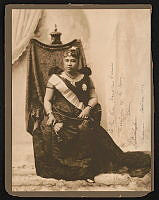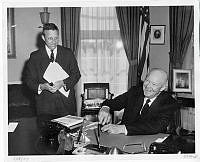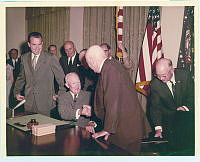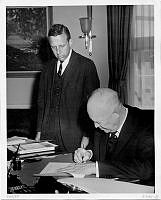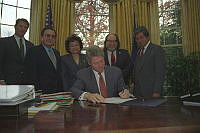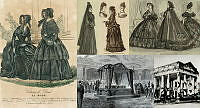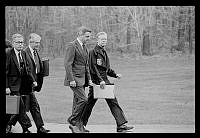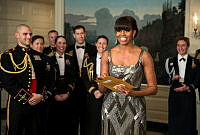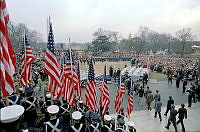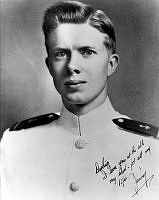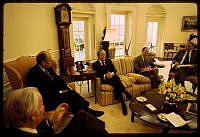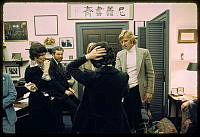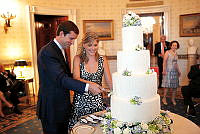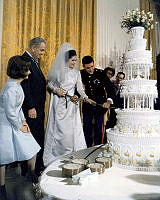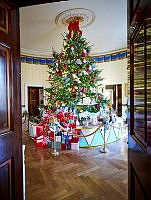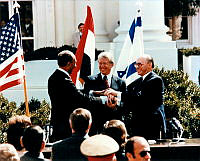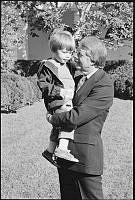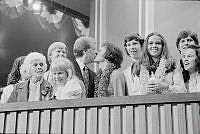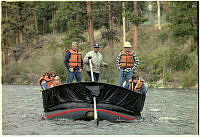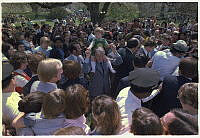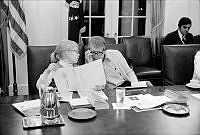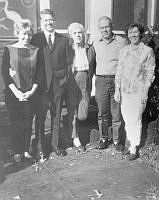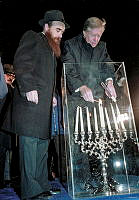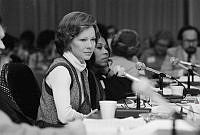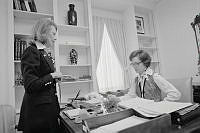Harry S. Truman

During his few weeks as vice president, Harry S. Truman scarcely saw President Roosevelt, and received no briefing on the development of the atomic bomb or the unfolding difficulties with Soviet Russia. Suddenly these and a host of other wartime problems became Truman’s when, on April 12, 1945, he became president when Roosevelt died. He told reporters, “I felt like the moon, the stars, and all the planets had fallen on me.”
Truman was born in Lamar, Missouri, on May 8, 1884. He grew up in Independence, and for twelve years prospered as a farmer. He went to France during World War I as a captain in the Field Artillery. Returning, he married Elizabeth (Bess) Virginia Wallace, and opened a haberdashery in Kansas City, which failed.
Active in the Democratic Party, Truman was elected a judge of the Jackson County Court (an administrative position) in 1922. He became a senator in 1934. During World War II he headed the Senate War Investigating Committee, exposing waste and corruption and saving perhaps as much as $15 billion.
As president, Truman made some of the most crucial decisions in history. Soon after V-E Day, the war against Japan had reached its final stage. An urgent plea to Japan to surrender was rejected. Truman, after consultations with his advisers, ordered atomic bombs dropped on the cities of Hiroshima and Nagasaki. Japanese surrender quickly followed. In June 1945 Truman witnessed the signing of the charter of the United Nations.
Soon he presented to Congress a 21-point program, proposing the expansion of Social Security, a full-employment program, a permanent Fair Employment Practices Act, and public housing and slum clearance. The program, Truman wrote, “symbolizes for me my assumption of the office of president in my own right.” It became known as the Fair Deal.
In 1947 the Soviet Union pressured Turkey and, through guerrillas, threatened to take over Greece. Truman asked Congress to aid the two countries, as part of what was soon called the Truman Doctrine. The Marshall Plan, named for his secretary of state, stimulated spectacular economic recovery in war-torn western Europe.
When the Soviets blockaded the western sectors of Berlin in 1948, Truman created a massive airlift to supply Berliners until the Soviets backed down. Meanwhile, he was negotiating a military alliance to protect Western nations, the North Atlantic Treaty Organization (NATO), established in 1949.
In 1948, Truman faced New York Governor Thomas Dewey and a left-leaning third-party challenger, former Vice President Henry Wallace, and defied the predictions of pollsters and analysts to win his own full term as president. After the election, the Trumans moved out of the sagging White House so that it could be gutted and reconstructed. The Truman White House renovations were completed in 1952.
In June 1950, the Communist government of North Korea attacked South Korea. Truman later wrote, “There was no suggestion from anyone that either the United Nations or the United States could back away from it.” A discouraging struggle ensued as U.N. forces held a line above the old boundary of South Korea. Truman limited the fighting, which frustrated Americans—especially his Korea commander General Douglas MacArthur, whom he fired for insubordination.
Having served almost two terms, Truman decided not to run again. Retiring with Bess to Independence, he lived until December 26, 1972. Later, Americans came to appreciate his honesty, sound judgment, and courageous decision making, admiring him far more than his own contemporaries had. Of his presidency, Truman modestly said, “Well I wouldn’t say I was in the ‘great’ class, but I had a great time while trying to be great.”













